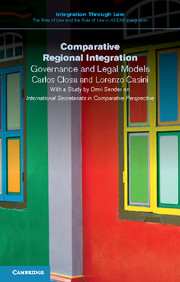Book contents
- Frontmatter
- Contents
- List of figures
- List of tables
- General editors’ preface
- Preface
- List of abbreviations
- Chapter 1 Governance structures and processes in integration organizations
- Chapter 2 The development of international legal regimes
- Study Lead, follow or get out of the way? International secretariats in comparative perspective
- Executive summary
- Index
Chapter 1 - Governance structures and processes in integration organizations
Published online by Cambridge University Press: 05 August 2016
- Frontmatter
- Contents
- List of figures
- List of tables
- General editors’ preface
- Preface
- List of abbreviations
- Chapter 1 Governance structures and processes in integration organizations
- Chapter 2 The development of international legal regimes
- Study Lead, follow or get out of the way? International secretariats in comparative perspective
- Executive summary
- Index
Summary
Introduction: credible commitments and formalization
This chapter proposes the following thesis: States entering regional (and other) organizations accept formal commitments to achieve their goals with the expectation that other participant States will reciprocate. The legal and institutional features of the organization create credibility by locking participants into a system which regulates their behavior and restricts their ability to release themselves from the commitments accepted. By locking themselves into specific policy choices, States reduce the margin of action for future governments, and thus the risk that they will change them. My thesis is that the intensity and extent of the formal commitments depend directly on the kind of objectives/regional public goods that the organizations pursue. The larger the number of objectives, and the more ambitious in relation to the current status quo, the more robust the institutional commitments need to be if the organization is to succeed in attaining them. There is a trade-off between yielding sovereignty (that is, accepting credible commitments) and entering into complex integration schemes. Less ambitious objectives may be attained with a lower level of institutional commitment.
This study will focus on the formal mechanisms that secure “credible commitments.” Credible commitments result from institutional design which comprises a number of instruments: the regulation of membership; the institutional structure of integration organizations; the decision-making procedure; the nature of derived norms and the mechanisms for their incorporation into national orders; and the mechanisms of jurisdictional control, supervision and scrutiny. Each of these serves to “lock” participants into integration schemes, and restricts their freedom to withdraw from accepted commitments.
By focusing on institutional design, this study adopts a clear position on regional integration: it considers that integration is a formal process. Current scholarship has consolidated a conceptual difference between “regionalization” and “regionalism.” These two concepts correspond to what in the 1990s W. Wallace insightfully named “informal” and “formal” integration respectively. Regionalization, or informal integration, refers to a spontaneous process of interaction between public or private actors, creating networks and directing flows towards each other in economic, security and cultural domains, among others.
- Type
- Chapter
- Information
- Comparative Regional IntegrationGovernance and Legal Models, pp. 1 - 153Publisher: Cambridge University PressPrint publication year: 2016



